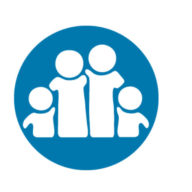Anxiety

What is Anxiety?
The term anxiety is synonymous with fear, nervousness, or worry. It is normal to experience anxiety at any given moment in life due to various reasons. For example, stress revolving around money, careers, health, relationships, or academic performance have been known to provoke anxiety. To obtain an anxiety diagnosis the following symptoms must be excessive or so persistent that they negatively affect your functioning in daily life.
Common Symptoms/How It Impacts Someone’s Life:
- Restlessness or feeling keyed up or on edge
- Being easily fatigued
- Difficulty concentrating or mind going blank
- Irritability
- Muscle tension
- Sleep disturbance (difficulty falling or staying asleep, or restless unsatisfying sleep)-DSM 5.
There are different types of anxiety disorders including generalized anxiety disorder, panic disorder, social anxiety disorder, and various phobias. The main causes of anxiety disorders are unknown. Like most disorders, a combination of genetics and environmental factors could play a role.
What Can Anxiety Look Like?

In Crisis
Increased anxiety
Feeling out of control
Panic or sensing doom
Feeling restless and tense
Increased heart rate
Negative thought processes
Poor sleep and general health

Struggling
Anxious
Fatigued
Irritability
Unexplained physical aches
Difficulty controlling feelings of worry
Poor Appetite

Surviving
Nervousness
Restless
Ignored worries
Trouble sleeping
Distracted
Tension

Persevering
Managing
Some concerns
Keeping up with regular routines
Some socialization

Excelling
Normal fluctuations in mood
Normal sleep patterns
Physically well
Energetic
Consistent performance
Socially active
Ways to Treat Anxiety:
There are many helpful treatments for anxiety and options for every level of care.
Universal Precautions (things you can do and plan on your own)
• Stay physically active.
• Avoid alcohol and recreational drugs
• Cut down on smoking or drinking caffeinated beverages
• Use relaxation techniques (meditation, yoga, mindfulness)
• Eat healthy foods
• Prioritize sleep
• Learn about your disorder
• Identify triggers
• Socialize
• Keep a journal
Evidence Based Treatment Options (Reaching out to a trained professional)
• Therapy
• ACT
• CBT
• DBT
• Exposure Therapy
• Mindfulness Based Cognitive Therapy
• Parent-Child Interaction Therapy
All therapeutic styles will involve learning about:
• The way our brains operate (the stress response system, expected cognitive
impairments when we are under stress),
• Symptoms of anxiety and learning to calm physical tensions.
• The way that thoughts, feelings, and behaviors are linked and influence each
other.
• Most therapeutic styles involve exploring without judgment one’s feelings,
beliefs, thoughts, and habits to reframe /expand awareness /experiment with
ideas. This allows the thoughts, feelings, and behaviors to change and
influence each other in new ways.
• Therapy also involves learning about and practicing strategies and coping
habits that support wellbeing.
• Medications –there are many medication options that have shown some benefit in
reducing anxiety symptoms.
If you or someone you know is in Crisis and unable to perform daily activities:
Symptoms may be or become overwhelming and prevent a person from engaging many of the above interventions. People who are in crisis may require a more intensive treatment plan. When this is the case, call a professional as soon as possible. What happens next might include:
• Health and Safety Assessment (HSA)—people experiencing a crisis may benefit from a structured interview with a mental health clinician to assess the threats to their wellbeing and provide recommendations regarding seeking treatment.
• Partial Hospitalization Programs (PHPs)
• Intensive Outpatient Programs (IOPs)
If you or someone you know is in Danger of harm (Immediately call 9-1-1 or go to a crisis-trained organization)
• Emergency Room Hospitalization. Dial 9-1-1 or proceed to your nearest emergency room if you or someone you are with is in imminent danger of harm
Resources
https://www.nami.org/About-Mental-Illness/Mental-Health-Conditions/Anxiety-DisordersE
Dare: The New Way to End Anxiety and Stop Panic Attacks Paperback by Barry McDonagh
Declutter Your Mind: How to Stop Worrying, Relieve Anxiety, and Eliminate Negative Thinking Paperback –by S.J. Scott (Author) and Barrie Davenport (Author)

